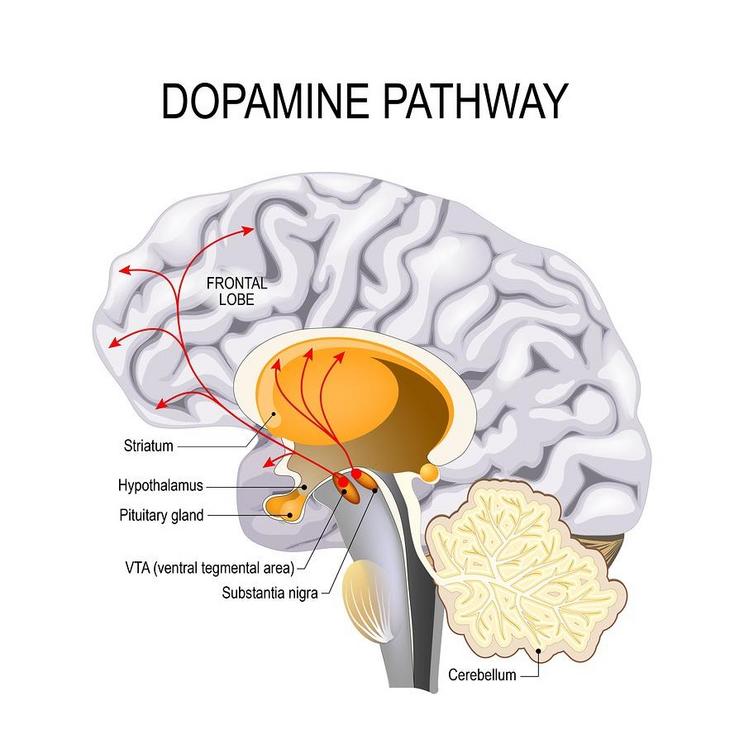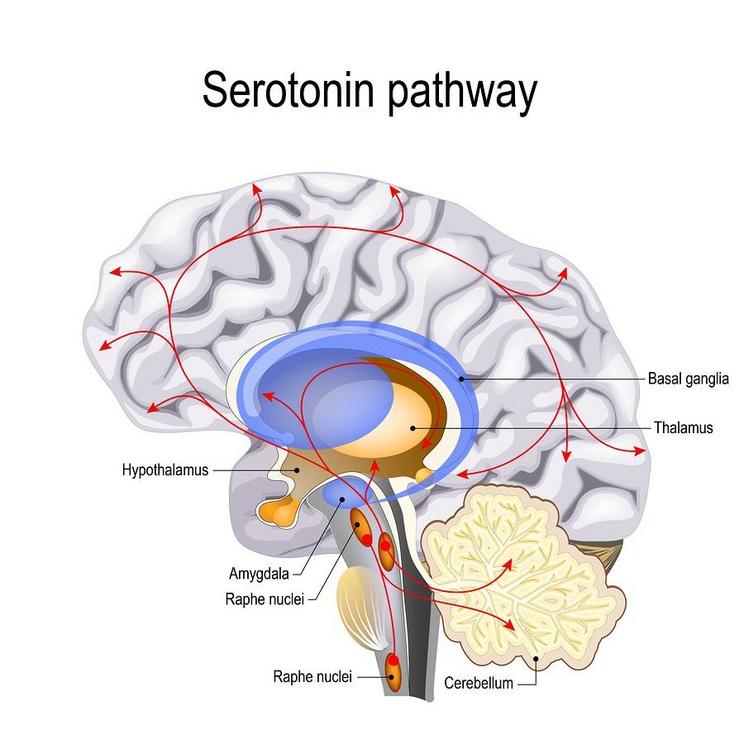Breaking smart phone addiction: raising serotonin in the brain
During active small screen addiction, there is a constant sense of being drawn to the devices and to use certain apps with the hope of gaining fulfillment, satisfaction, and pleasure. In other words, there are cravings that compel people to do certain things with their smartphones and tablets in the hope of getting a dopamine release and feeling good.
Checking your phone every few minutes all day long, spending endless hours on apps such as Facebook, preferring to text rather than speak in person, getting up in the middle of the night to check your phone, texting while driving, losing touch with work responsibilities and family obligations are just a few of the symptoms of small screen addiction.
As small screen addiction progresses, excessive dopamine levels in the brain cause brain neurons to downregulate their dopamine receptors. This prevents people from experiencing the pleasure they once enjoyed from their small screens. Eventually there is no pleasure, only compulsive use of the small screens, which is an indication that neurons in the brain have begun to die from overstimulation by dopamine.
Prolonged stimulation of neurons by high dopamine levels also reduces serotonin in the brain, which means that small screen addicts also lose the sense of happiness and contentment they once enjoyed.
The role of hormones in small screen addiction and the symptoms of addiction were explained in the previous article in this series:
Smartphone Addiction Related to Sugar, Narcotics, Alcohol, Pornography, Gambling Addictions
We saw that small screen addiction alters dopamine and serotonin levels in the brain in the same way as addiction to narcotics, sugar, alcohol, pornography, etc.
We also saw that from an addiction standpoint, apps such as Facebook, YouTube, SnapChat, and many others, may as well be drugs – because of their power to release dopamine in the brain and inhibit serotonin. And their power to get us hooked is just as strong as any drug.
The simple truth is that many small screen apps promise to give us happiness, but they ultimately steal both pleasure and happiness, leaving us unfulfilled, discontented, and depressed.
Two sides of the Addiction Equation – Dopamine and Serotonin Must Both be Addressed
Dopamine: Some interventions will need to curb and control the use of small screens. Those interventions will break the patterns of craving which seek fulfillment and pleasure on the internet. This is the dopamine side of the equation.
Serotonin: Other interventions address the serotonin side of the equation. These will include lifestyle changes that will provide a stronger foundation for weathering the trials of life and experiencing a renewed sense of contentment and happiness.
Dopamine + Serotonin = Freedom: As a practical matter, it is necessary to address the dopamine and serotonin sides of the equation at the same time. However, starting by adding something more healthy to our lives can be an important step to take before trying to remove what is unhealthy.
Thus, this article will focus on raising serotonin in the brain. This will improve the sense of well-being and help to restore contentment and happiness.
Strategies for Building Up Serotonin, Happiness, and Contentment
Dr. Robert Lustig, M.D., developed what he calls the 4-Cs to help people with any form of addiction to re-establish adequate serotonin levels in the brain so that they can experience happiness again. Dr. Lustig has been studying hormones and brain function for more than 30 years. [1]
His latest book is entitled, The Hacking of the American Mind: The Science Behind the Corporate Takeover of Our Bodies and Brains. This book shows how happiness and pleasure are two distinct physiological conditions, which have intentionally been conflated to become one generalized emotional state. [2, 3]
According to Dr. Lustig, it is essential to understand the difference between pleasure and happiness in order to successfully address our addictions. [2, 3]
The 4-Cs are a counterbalance to the active addiction that drives down dopamine, kills neurons in the brain, and inhibits serotonin.
The 4-Cs of the Serotonin Up-Building Process – Connect, Contribute, Cope, and Cook
Dr. Lustig calls the serotonin up-building process his 4-Cs: Connect, Contribute, Cope, and Cook.
When these are in place in a person’s life, it will become easier to break small screen addictions and the endless use of small screens to seek after dopamine-induced pleasure.
First C: Connect
Interpersonal connections are extraordinarily important for building up serotonin and happiness, because most all communication done through small screens is highly impersonal – even though on the surface it might appear that people are chatting with best friends.
Dr. Lustig stated:
… Face-to-face and eye-to-eye connection generates something called empathy. Empathy activates a specific set of neurons in your brain that has been termed mirror neurons. So that the feelings of the person you are talking to ultimately become adopted by you as well. In that process you generate contentment [happiness].
… What about non-interpersonal connection like for instance Facebook? It turns out that Facebook actually sows unhappiness in part because there is no interpersonal connection – there is no serotonin rise. There is a dopamine rise every time a message flashes across your screen (variable reward), which actually causes you to increase your actions to access more Facebook. This actually drives further depression and the data now show that this is a vicious cycle. [1]
Second C: Contribute
Dr. Lustig stated:
It means to contribute outside of yourself. You can do it within your work by making the work a better place for your colleagues or you can do it outside of your work by volunteerism or philanthropy.
There are a lot of different ways to contribute. Ultimately it has to be outside yourself. [2]
In doing so, we begin to break the self-centered patterns exhibited by people with active addictions. This teaches us to see the needs of others and to provide them with practical help.
Third C: Cope
When we take steps to reduce our stress, we create conditions that enable our serotonin receptors to function properly, thus giving us the experience of happiness.
I will summarize Dr. Lustig’s three ways to improve our ability to cope and reduce stress in our lives.
Get adequate sleep. Turn off your small screen devices at night and keep them outside the bedroom when charging.
Christine Madison at the University of California Berkeley, showed that 8th graders who slept with their cell phone in their room got 28 minutes less sleep each night than those who charged their cell phones outside the room.
Phones in the bedroom are a distraction from sleep. The blue light they emit also activates the part of the brain that keeps us awake.
Our lack of mindfulness regarding our commitments can make us unhappy. Multitasking is probably the biggest single destroyer of happiness we have. People prize themselves on being able to multitask, and companies look for people who are good at multitasking.
It turns out that only about 2.5% of the population can actually do two things at once. As a result, the more things we take on the quicker we will get unhappy and the lower our serotonin levels go.
Regular exercise will tamp down dopamine and increase serotonin. Regular exercise can be a mitigator of stress, which can advance serotonin levels.
Fourth C: Cook
When we buy prepared food or eat in restaurants we rarely know anything about the food we are eating. Home cooked food with healthy ingredients will give us what we need for building serotonin levels and will remove toxic substances that push up dopamine and inhibit serotonin.
Dr. Lustig described three items in the diet that matter in terms of the serotonin and dopamine connection. I will summarize his recommendations.
Eat food containing Tryptophan. The body needs the amino acid tryptophan to make serotonin. It is the rarest amino acid in our diet. It’s found in fish and flax, [2] in addition to being available from eggs, turkey, and nuts. [4]
Eat food containing Omega-3 fatty acids. They are found in fish and they are found in certain foodstuffs containing algae or in things that eat algae.
Omega-3 fats in the diet provide stability to neuronal membranes. This means neurons can be compressed more easily and return to their normal shape, thus avoiding the death of neurons that drive happiness.
Avoid food containing fructose. Fructose, a form of sugar, is one of the most common food additives. It drives up dopamine and drives down serotonin.
Dr Lustig describes healthy food. He stated:
So, high tryptophan, high omega-3 fatty acids, and low fructose – this is called real food. When you cook for yourself that is what you are making and that is what you are eating. And when you are cooking for yourself and your family you get the interpersonal connection, you get the contribution to something outside yourself. It is basically a win-win-win.
On the other hand [when we eat] fast-food we are eating alone, we are eating things that we don’t know what is in it, and we are eating a lot of sugar because every item at a fast-food restaurant has been spiked with added sugar specifically for their purposes and not yours.
So, we have moved on to a fast-food consumption society in the process we have actually impeded our ability to get happy. [2]
Personal Reflections – Building Up and Tearing Down –Freedom from Addictions

As I mentioned at the beginning of this article, addressing addiction involves engaging in activities that will build up serotonin.
Of course, by itself, this is not enough to go against the power of addictive small screen apps, which target the release of dopamine in the brain. The relationship with dopamine-stimulating apps must be torn down bit by bit.
Both sides of the hormonal equation need to be addressed in order to achieve freedom from any form of addiction.
Small screen addiction is not unique. The pattern of hormonal activity associated with this addiction is identical to what is observed in drug addiction, pornography addiction, and food addiction.
I have a long history with addiction in my life. I was addicted to sugar and carbohydrates by the time I was four-years-old.
I didn’t learn that sugar is more of a drug than a food until I was over fifty. As a sugar addict, I struggled to use willpower to change my eating habits and to lose weight.
The result was that I could never control my weight or make permanent changes in my eating habits until I realized that I had to treat my problem as an addiction.
People with out-of-control small screen usage must also realize and admit that they are dealing with an addiction that has the power to control and eventually destroy their lives.
Connect
Many small screen addicts think they are connecting, because of all the texting they do, however, there is much more to achieving real human contact than the sending of texts and email, and the receiving of “likes” from “friends.”
Dr. Lustig mentioned face-to-face communication for building the capacity to have empathy for others.
Taking this one step further, the communication needs to be honest. Addicts are usually good at projecting a fake face.
Connecting also means heart-to-heart communication where our emotional reality is transparently communicated to others. I am still making discoveries and facing challenges in this area.
Contribute
It is true that many addicts don’t care about the needs of others – they are self-absorbed. They often don’t realize how they are neglecting the needs of others.
However, many others are highly involved with social movements and participate in family activities that look good to the outside world.
I spent more than 30 years highly involved with many not-for-profit organizations and serving on local government advisory boards. Regardless of my good deeds, I was still actively addicted.
Contributing to others is about meeting people where they are and reaching out to them through heart-felt empathetic understanding. It is about building long-lasting relationships based on mutual trust, which is nearly impossible through electronic devices.
It is not about how many friends a person has on Facebook, but about the depth of genuine concern and compassion that we experience for one another.
Cope
Addicts cope with stress by engaging with their addictions – whatever they might be. Dr. Lustig identified sleep, mindfulness, and exercise as key parts of a stress reduction plan.
I want to highlight mindfulness of our commitments, because the world we live in today is constantly trying to suck us into new activities all of which sound important.
I am learning that I must choose how I spend my time, and I must resist good sounding invitations from the internet in order to maintain freedom from addiction. The higher a person’s stress level, the more likely he or she is to engage in addiction in order to escape the stress and other unwanted feelings.
So, every time I see a notification, read the subject of an e-mail or land on a webpage that is begging me to do something, I stop and consider whether I really even have time to read it.
I have developed a short list of priority areas in my life, and focus my attention there. Sometimes when I am not sure about getting involved, I pray to God about whether I should respond, so that I can avoid living a frenetic, fragmented, and addicted life.
Cook
I have been working on adopting a real food diet for almost 20 years. This has helped me overcome my sugar addiction, because sugar and carbohydrates are no longer part of my daily diet.
My wife and I are fortunate that we can grow and preserve our own homegrown vegetables and can buy almost all our grass-fed meats from local farmers. The quality of our diet is actually far superior to organic standards.
We eat a real food ketogenic diet, which gives us a clear mind for meeting the challenges of life.
Eating junk food or frequently eating in fast-food restaurants clouds the mind, weakens the body, and makes it easier to submit to the power of addiction.
Next Article – Tearing Down Dopamine Habits
The next article will help people make new choices about how they use small screen devices.
Suggestions will target the needs of individual small screen addicts as well as families.
It is not uncommon for parents, young children, and teens to all be engaged in small screen addictions, and it can be beneficial for family members to work together to change how they relate to this technology and how they relate to one another.
Finally, we will look at the spiritual side of addiction and consider the true source of power that is needed to overcome addiction.
For full references please use source link below.


